Lure Beneficial Insects to Your Richmond Yard This Spring
Ready to transform your yard into a haven for nature's helpers? Get started with a personalized plan. Request Your Free Quote Today!
Introduction: Welcome Beneficial Bugs to Your Richmond Oasis This Spring!
Hey Richmond neighbours! Spring has sprung (finally!) here in the greater Ottawa area, and like many of you, we're itching to get back into our gardens. As you plan your vibrant flower beds or dream of delicious home-grown veggies, let's chat about inviting some very special guests to your yard this year: beneficial bugs!
Now, hold on – "bugs" and "beneficial" in the same sentence? Absolutely! While we often focus on the annoying pests that nibble our leaves (we see you, aphids!), there's a whole crew of *good* insects working hard for us. Think of them as nature's tiny pest control squad and pollination experts, rolled into one helpful package. These garden allies munch on destructive insects, help pollinate our flowers and vegetables, and contribute to a healthier, more balanced garden ecosystem. Encouraging them is a fantastic, natural approach to landscaping and garden care.
Quick Guide to Attracting Beneficial Insects:
- Plant a variety of native flowers with different bloom times.
- Provide a shallow water source with landing spots (pebbles).
- Avoid using broad-spectrum pesticides; let good bugs control pests.
- Leave some plant stems and leaf litter for overwintering habitat.
- Maintain healthy soil with compost.
Creating a welcoming habitat for these helpful critters is easier than you might think, whether you're tending a spacious lot near Manotick or nurturing a cozy garden right here in Richmond. Forget reaching for harsh sprays first; attracting the *right* kind of bugs can make your gardening life so much easier (and more fascinating!).
In the sections that follow, we’ll dig into simple, practical tips to roll out the welcome mat for these garden guardians. We’ll explore specific plants they love, easy ways to provide shelter, and how making small changes can turn your Richmond yard into a thriving oasis where beneficial bugs feel right at home. Let's get started!
Meet Your Garden's MVP Insects: Ottawa's Beneficial All-Stars
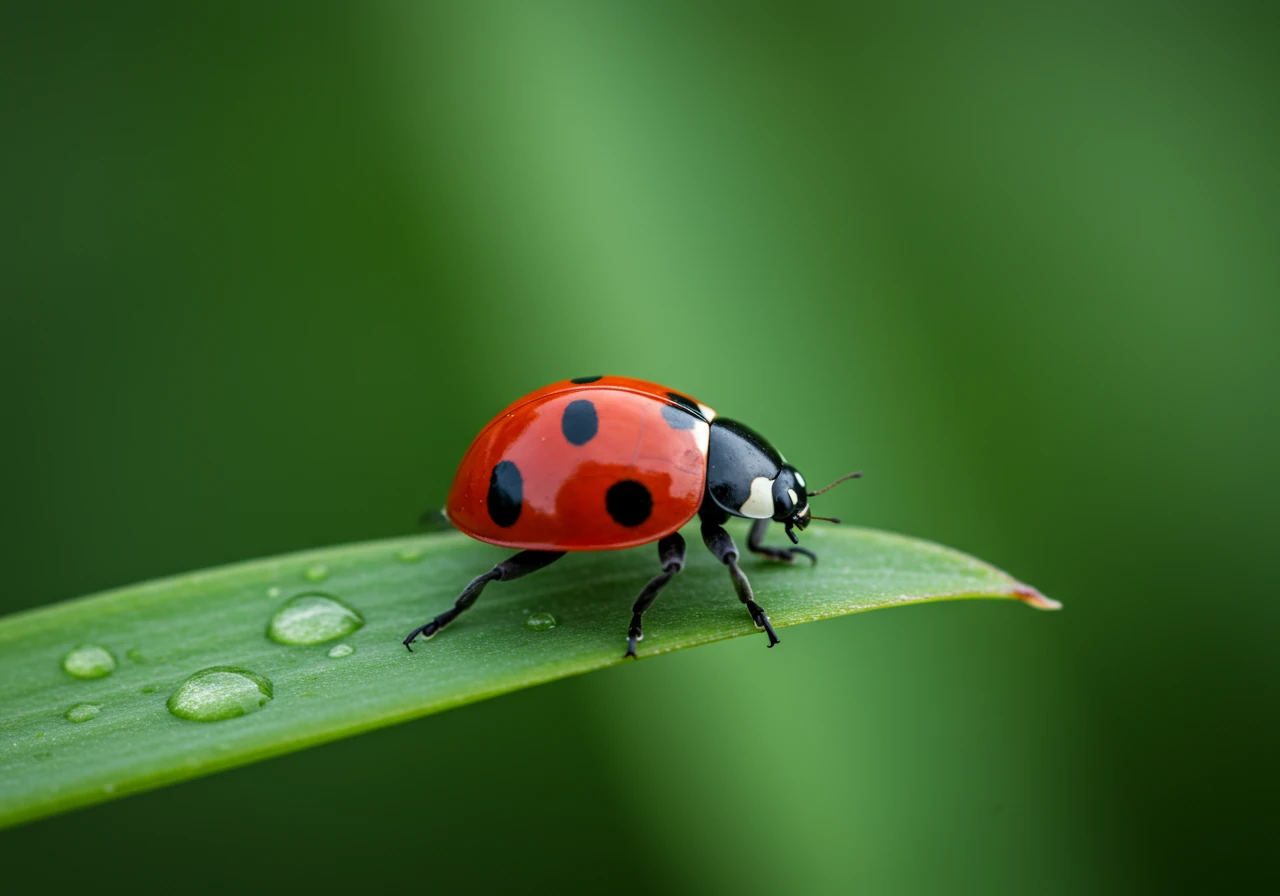
Alright gardeners, let's roll out the green carpet for the true Most Valuable Players of your Ottawa landscape – the beneficial insects! These aren't the villains munching your prize-winning petunias; they're the superheroes working behind the scenes (or sometimes right out in the open!) to keep your garden healthy and thriving. Think of them as your free, all-natural pest control and pollination service, working tirelessly from Barrhaven to Greely. Let's meet some of the local all-stars:
- Ladybugs (Lady Beetles): Everyone recognizes these cute, polka-dotted beetles! But don't let their charming looks fool you – both the adults and their alligator-like larvae are *voracious* aphid-eating machines. A single ladybug can chow down on thousands of aphids in its lifetime. Spotting them is a great sign your garden ecosystem is starting to balance.
- Lacewings: These delicate beauties have intricate, lacy wings (hence the name!) and are usually green or brown. While the adults often sip nectar, their larvae, sometimes called "aphid lions," are ferocious predators. They patrol your plants, gobbling up aphids, mites, thrips, and pesky insect eggs with gusto.
- Hoverflies (Syrphid Flies): Often mistaken for small bees or wasps due to their yellow and black markings, hoverflies are harmless mimics. The key difference? Flies have only one pair of wings. Their slug-like larvae are fantastic aphid predators, while the adults are important pollinators, buzzing between blossoms just like bees. Encouraging them boosts both pest control and flower power!
- Ground Beetles: These guys are the night shift. Usually large, dark, and shiny, ground beetles roam the soil surface after dark, hunting slugs, snails, cutworms, and other soil-dwelling pests. Providing leaf litter or mulch gives them a place to hide during the day. Keeping your garden healthy sometimes means leaving a little "mess" for these protectors. You can learn more about creating overwintering spots in our guide to Winchester Fall Garden Care Tips for Winter Survival.
- Minute Pirate Bugs: Tiny but mighty! These small, black-and-white insects are effective predators of thrips, spider mites, and insect eggs. You might need to look closely to spot them, but they pack a punch against small pests.
Supporting these garden helpers involves thoughtful landscaping choices. Sometimes, it's about what *not* to do, like avoiding harsh pesticides or leaving some plant debris for shelter over winter – think about this when performing your Richmond Garden Tools Winter Prep and Clean-up. Practices like careful pruning can also contribute to overall plant health, making them more resilient; check out our tips on Russell Summer Pruning Secrets for Garden Vitality. Regularly observing your plants helps you spot both pests and beneficials, a key part of any Russell Garden Vitality Check to Prevent Fall Plant Loss. If creating the ideal habitat feels overwhelming, remember that professional Landscaping and Gardening Services can help establish a garden environment where these MVP insects will thrive.
Planting Power: Creating a Buffet for Beneficials in Your Yard
Okay, let's dish up the details on how to turn your yard into a five-star restaurant for beneficial bugs!
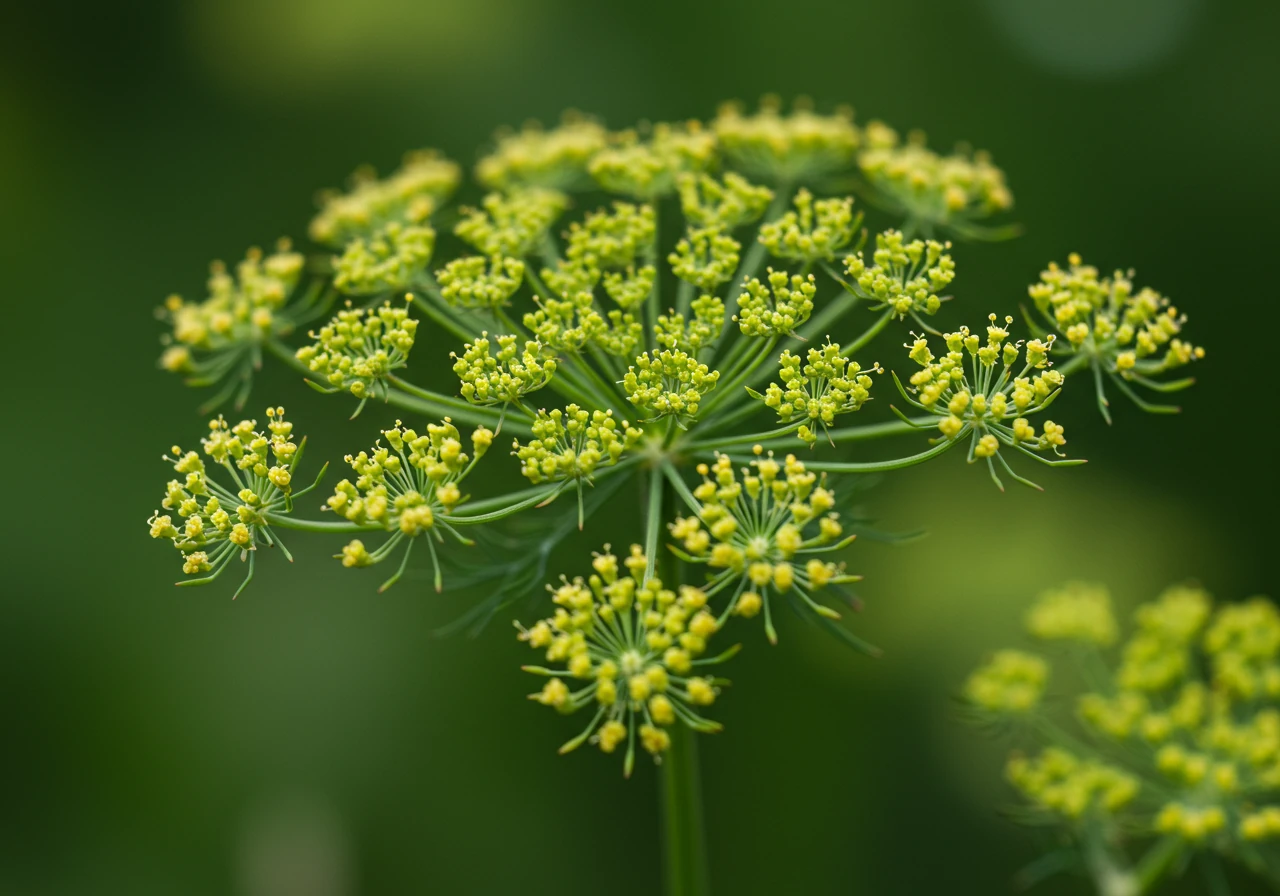
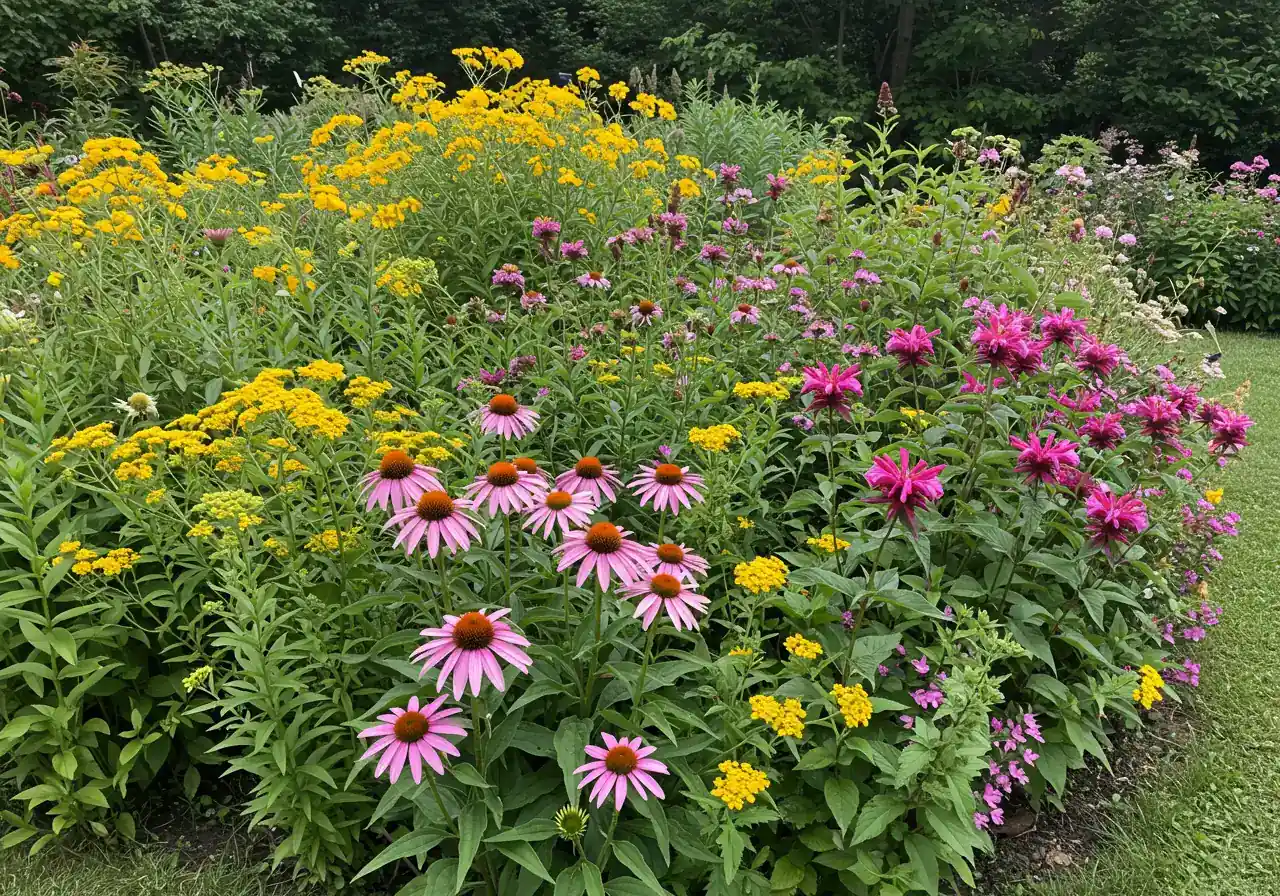
Think of your garden as a potential all-you-can-eat buffet for the good guys – the ladybugs, lacewings, hoverflies, and helpful pollinators we talked about. If you want them to stick around and do their pest-munching, flower-pollinating jobs, you need to offer the right menu! Planting strategically is one of the *best* ways to roll out the welcome mat, whether you're landscaping a large lot out in Greely or tending a charming garden patch right here in Richmond.
So, what's on the menu?
Tip 1: Serve Up Some Local Flavour (Go Native!)
Our Ottawa-area insects have evolved alongside native plants for centuries. They recognize these plants as food sources and habitat. While many non-native flowers are beautiful, incorporating native species that thrive in our Zone 5 climate is like offering familiar comfort food. Plants like Wild Columbine, Black-Eyed Susans, and Canada Anemone are often perfectly suited to our local soil and weather, requiring less fuss once established. They're the foundation of a healthy garden ecosystem. For guidance on native plants, check resources from the Rideau Valley Conservation Authority or the City of Ottawa's naturalization projects. If you're clearing out areas to make space for these native wonders, especially removing invasive species, services like a Marionville Yard Cleanup Service or general City Garden Clean Up Service can help you prep the beds properly.
Tip 2: Variety is the Spice of Life (Plant Diversity!)
Imagine eating *only* mashed potatoes every single day. Boring, right? Beneficial insects feel the same way! Different insects are attracted to different types of plants for food (pollen, nectar) and shelter. Planting a wide variety of flowers, herbs, and even some grasses provides resources for a broader range of beneficial species. Mix heights, textures, and bloom times. A diverse garden is a resilient garden. Proper Soil Preparation is key to supporting plant diversity.
Tip 3: Keep the Kitchen Open (Season-Long Blooms!)
Beneficial insects need food throughout the growing season, not just in peak summer. Plan your garden to have something blooming from early spring right through to late fall. This continuous food supply keeps them fed and encourages them to stay put.
Spring Bloomers
Think early food sources! These plants provide crucial nectar and pollen when beneficials first emerge.
- Pussy Willow (Salix discolor - great for early pollinators!)
- Wild Geranium (Geranium maculatum)
- Chives (provide nectar and deter some pests)
- Lungwort (Pulmonaria)
- Creeping Phlox (Phlox subulata)
Summer Powerhouses
This is peak season! Offer a wide variety to attract different insects.
- Coneflowers (Echinacea - beloved by bees and butterflies)
- Milkweed (Asclepias species - *essential* for Monarchs!)
- Yarrow (Achillea - flat-topped flowers attract tiny beneficials)
- Bee Balm (Monarda - magnets for bees and hummingbirds)
- Herbs: Dill, Fennel, Parsley (let some flower – their tiny blooms attract predatory wasps and hoverflies)
- Coreopsis (Tickseed)
Late Season Support
Don't forget the late bloomers! These provide food before winter sets in.
- Goldenrod (Solidago species - *not* the cause of hay fever, that's ragweed!)
- Asters (Symphyotrichum species - crucial late-season nectar)
- Sedum 'Autumn Joy' (provides landing pads for larger insects)
- Joe Pye Weed (Eutrochium purpureum)
- Sneezeweed (Helenium autumnale)
Preparing your garden beds in the fall sets the stage for next year's buffet; consider help from a Metcalf Property Cleanup Service to ensure dead plant matter isn't harbouring pests overwinter.
Flower Shapes Matter Too!
It’s not just *what* you plant, but the *shape* of the flowers.
- Tiny beneficials like parasitic wasps and hoverfly larvae prefer clusters of very small flowers where they can easily access nectar (think dill, yarrow, Queen Anne's Lace).
- Bees and butterflies often favour flowers with flatter "landing pads" (like coneflowers, sunflowers, asters) or tubular shapes they can dip into (like bee balm).
By planting a diverse range of native and other beneficial-friendly plants with blooms throughout the season, you create a vibrant, living landscape. It takes a bit of planning, but the payoff – a healthier garden buzzing with life – is huge. Need a hand designing or implementing your beneficial buffet? Our expert Landscaping and Gardening Services can help you choose and plant the perfect combination for your yard. Plant these beauties, provide a little water and watch the magic happen. Your garden (and its tiny guardians) will absolutely Thank You!
Beyond Flowers: Building a Five-Star Habitat for Helpful Critters
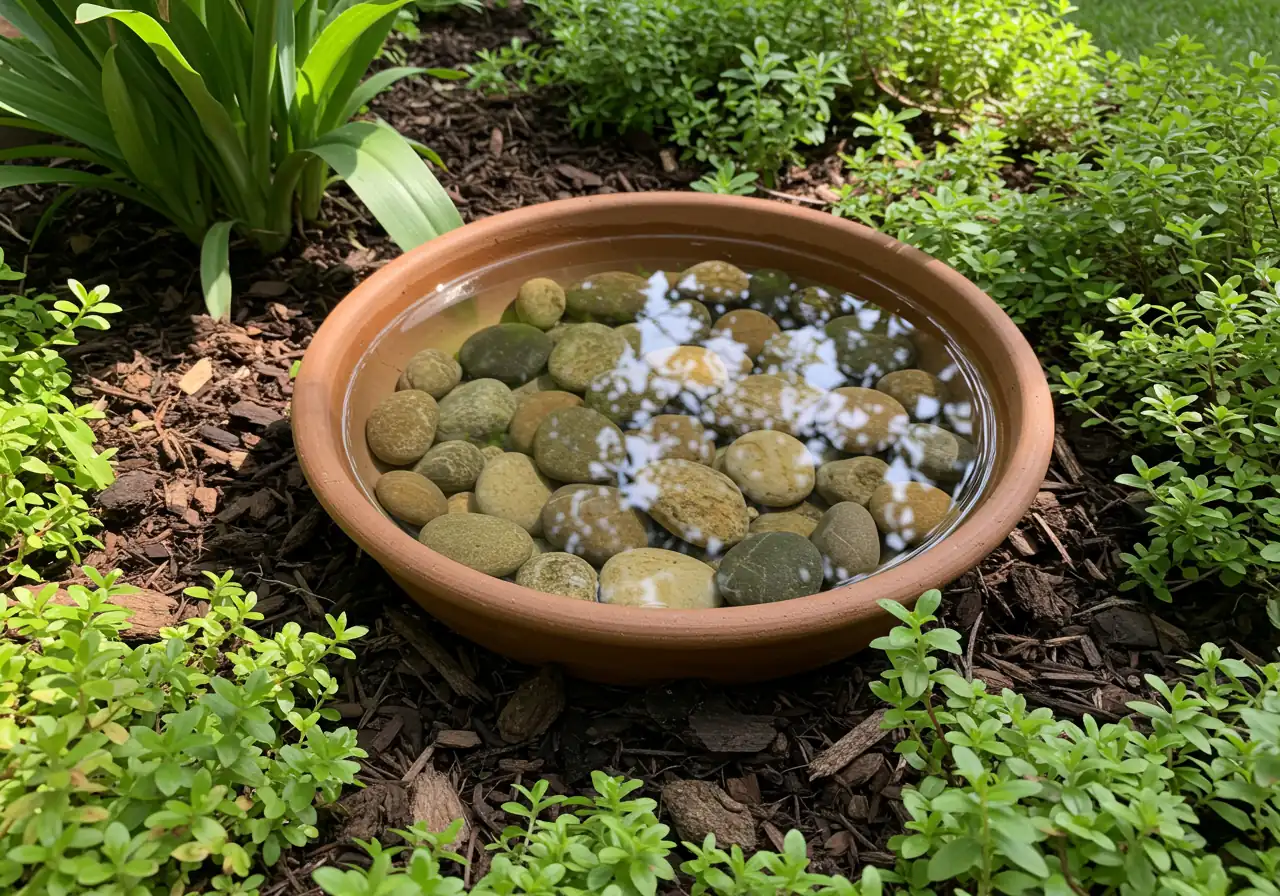
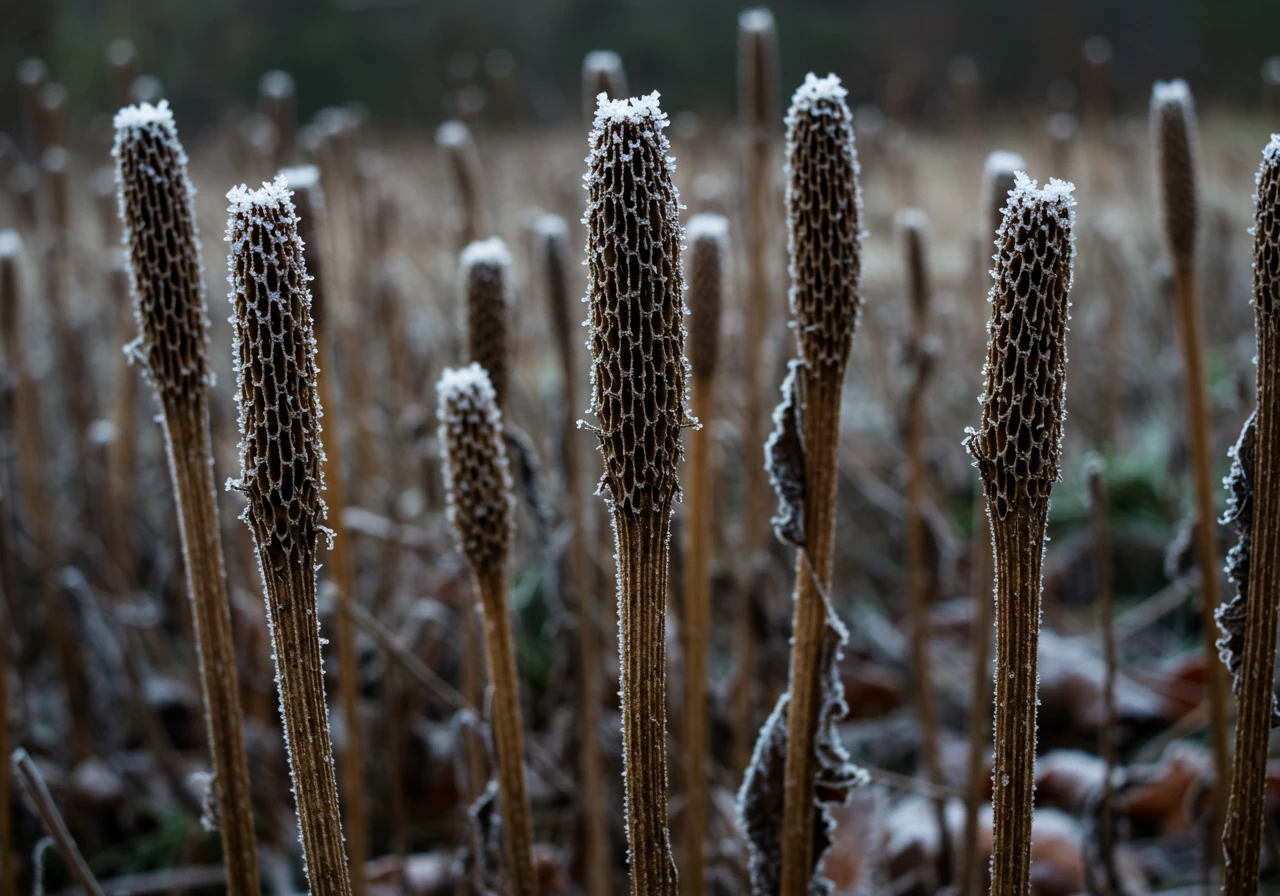
Okay, garden superstars, you've planted a glorious buffet brimming with pollen and nectar – fantastic! But to *really* roll out the red carpet and convince those beneficial bugs to become permanent residents (think tiny tenants who pay rent by eating pests!), we need to think beyond just the food. Like us, they need water, shelter, and a safe place to ride out those chilly Ottawa winters. Creating this five-star habitat is easier than you think, and it doesn't require turning your Kars backyard into a jungle!
- Hydration Station: Just like us after a bit of gardening, bugs get thirsty! Especially during hot, dry spells. Providing a simple water source can make a huge difference.
- Easy Tip: Place a shallow dish (like a plant saucer or an old pie plate) filled with pebbles, marbles, or small stones and add water. The stones give insects a safe place to land so they don't drown. Tuck it amongst your plants.
- Even Easier: Simply ensuring a patch of soil or mulch stays consistently moist can provide enough water for tiny critters. Good Mulching and Edging practices not only look neat but the mulch helps retain moisture, creating a slightly damp haven underneath.
- Sweet Shelters & Hideaways: Bugs need places to hide from predators (like birds) and take cover from harsh weather during the growing season. A perfectly manicured lawn offers little protection.
- Embrace Imperfection: Resist the urge to clear *every single* fallen leaf or twig, especially under shrubs or in garden corners. A little leaf litter is prime real estate for ground beetles and others. Consider our approach to Property Clean Up which can be tailored to leave beneficial habitats.
- Plant Power: Densely planted areas, ground covers, and even ornamental grasses offer excellent shelter.
- Rock On: A small pile of rocks or a few strategically placed logs (not treated wood) can become a bustling bug apartment complex.
- Winter Hangouts (Overwintering Sites): This is crucial! Many beneficial insects need safe places to spend the winter so they're ready to go in the spring. Aggressive fall cleanups can accidentally remove your entire pest-control crew for next year.
- Leave the Stems: Many beneficials overwinter in hollow plant stems (like those of coneflowers, bee balm, or ornamental grasses). Instead of cutting everything down to the ground in the fall, try leaving stalks standing until spring. You can tidy them up *after* temperatures consistently warm up.
- Leaf Piles = Life Piles: Rake leaves into garden beds or create a loose pile in an out-of-the-way corner instead of bagging them all up. This provides insulation and shelter. If a full property cleanup is needed, perhaps ask your provider, like a Ottawa Property Cleanup Service, to leave a designated small area undisturbed over winter.
- Balancing Act: Maintaining a garden that's both beautiful *and* beneficial-friendly is achievable. It's not about letting things get totally overgrown, but about thoughtful maintenance. If you need help striking that balance, professional help like a City Garden Maintenance Service can tailor their approach to support wildlife. Check our Google My Business page for reviews on our approach.
By providing these simple elements – water, shelter, and winter protection – you transform your garden from just a pretty space into a thriving ecosystem. It takes very little extra effort, and the payoff in natural pest control and pollination is huge. Your garden helpers will definitely Thank You! Still have questions about creating the perfect critter condo? Feel free to Contact Us!
Eco-Friendly Yard Care: Supporting Insects by Working with Nature
Okay, let's dive into how everyday yard care choices can make a huge difference for our tiny garden allies! It’s all about working *with* nature, not wrestling it into submission. Think of it as giving Mother Nature a helping hand, and she’ll reward you with a healthier, more vibrant yard – especially great for supporting beneficial insects in areas like Barrhaven or right across Ottawa.
So, you’ve planted the buffet and built the bug hotels (metaphorically speaking, maybe!). Now, how do we maintain the rest of the yard in a way that keeps our helpful critters happy and thriving? It’s simpler than you might think, and often means *less* work, not more!
- Ease Up on the Sprays: This is the big one. Many garden pesticides are like throwing a bug-bomb – they kill *everything*, including the ladybugs munching your aphids and the bees pollinating your tomatoes. Before reaching for a chemical spray, ask yourself: Is the "pest" *really* causing major damage? Often, a strong blast of water from the hose can knock off aphids, or you can simply prune away an infested leaf. If pests are a persistent issue, look for insecticidal soaps or horticultural oils, which are less harmful to beneficials when used carefully. Letting the good bugs handle the bad bugs is nature's free pest control! Even when doing larger jobs, like a Marionville Property Cleanup Service, the goal should be tidiness without sterilizing the environment. Check our Privacy Policy and Terms and Conditions for service details.
- Feed Your Soil, Feed Your Plants (and Bugs!): Healthy soil grows healthy plants, and healthy plants are better at resisting pests and diseases. Here in the Ottawa area, we often deal with heavy clay or sandy patches. The magic ingredient? Organic matter! Adding compost regularly improves soil structure (whether clay or sand), helps retain moisture, and feeds the soil microbes – the tiny underground workers that support plant health. Healthy plants mean less need for intervention, creating a better environment for beneficial insects. Forget the harsh chemical fertilizers; compost is king for long-term soil vitality. Incorporating this into regular Garden Maintenance is key.
- Rethink the Perfect Lawn: A perfectly uniform, weed-free, closely cropped lawn might look neat, but it’s practically a desert for most insects. Consider these bug-friendly tweaks:
- Mow Higher: Setting your mower blade higher (around 3 inches) helps shade the soil, retain moisture, and allows small flowering weeds like clover (a bee favorite!) to bloom. Proper Lawn Care can include higher mowing.
- Embrace Diversity: Allow a little clover or other low-growing "weeds" in your lawn. They provide food for pollinators.
- Less Lawn?: Consider reducing lawn space in favour of garden beds filled with diverse, insect-friendly plants. This is easier to manage long-term and way better for biodiversity. Sometimes a big overhaul needs professional help, like a Metcalf Yard Cleanup Service, to remove excess turf responsibly.
- Water Wisely: Watering deeply but less frequently encourages plants to develop deeper root systems, making them more resilient to drought and stress. Stressed plants are pest magnets! Water early in the morning so leaves dry quickly, reducing fungal disease risk. Avoid creating constantly soggy areas, but remember that slightly moist mulch provides habitat, as discussed earlier. This contrasts with some overly zealous approaches sometimes seen in a standard City Yard Cleanup Service where everything might be blown completely dry.
Making these shifts doesn’t mean letting your Metcalfe yard run wild (unless you want to!). It’s about making conscious choices that support the whole ecosystem. Sometimes, targeted help like a Marionville Garden Clean Up Service can focus on specific beds, incorporating compost and removing only problematic weeds while leaving beneficial habitats intact. By reducing chemical use, building healthy soil, adjusting lawn habits, and watering smart, you create a resilient, beautiful yard where beneficial insects feel right at home, helping you keep things balanced naturally.
Spring Kick-Start: Your Beneficial Insect Action Plan
Alright Richmond gardeners, spring is officially go-time! The snow's (mostly) gone, the birds are singing, and it's the perfect moment to put out the welcome mat for those helpful garden critters. Don't worry, attracting beneficial insects doesn't require a PhD in Bugology – just a few simple, well-timed actions. Think of this as your mini-plan to turn your yard into a bustling haven for nature's pest patrol.
Early Spring (April - Early May): The Gentle Wake-Up
Resist the urge to tidy *everything* immediately! Wait until temps are consistently above 10°C before major cleanup. Scout your yard and plan beneficial plantings. Need help with initial clearing? An Ottawa Property Cleanup Service can assist thoughtfully.
Mid-Spring (May - Early June): Build the Buffet & Homes
Start planting beneficial-friendly flowers/herbs. Add diversity! Set up water stations. Avoid early sprays – let beneficials work first. Consider Expert Garden Installation Services for new beds.
Late Spring (June): Monitor and Maintain
Observe insect activity. Continue avoiding broad-spectrum pesticides. Keep water sources filled. Maintain plant health with ongoing care, perhaps with regular Professional Garden Maintenance.
These spring steps are the start of bigger garden dreams! If you're envisioning major changes, like converting large lawn areas into pollinator havens, check out some inspiring Yard Makeovers and Transformations for ideas. If removing turf is part of your plan, proper preparation, akin to Lawn Removal and Sod Installation Prep, ensures the new garden bed is ready for planting.
Quick Wins for an Insect-Friendly Yard
Want a bug buddy bonanza in your Nepean yard without breaking a sweat? Here are some super simple wins:
- Plant Power: Add flowers beneficial bugs love, especially natives! Need ideas or hands-on help? Our Expert Garden Installation Services can transform your space. Find inspiration from local resources like the Ottawa Horticultural Society.
- Watering Hole: Set out a shallow dish with pebbles and water. Easy peasy hydration station!
- Spray Less, Smile More: Ditch harsh pesticides. Let ladybugs and lacewings be your pest patrol.
- A Little Mess is Best: Don't clear *every* leaf in the fall. Ask your cleanup crew, whether it's our general Ottawa Yard Cleanup Service or a specialized team like the Metcalf Yard Cleanup Service, to leave some shelter. Even larger jobs like a City Property Cleanup Service can be done thoughtfully.
- Who are we? Learn more About Us and our commitment to eco-friendly practices!
FAQs: Your Beneficial Insect Questions Answered (Ottawa Edition)
Great question! Many beneficial insects cleverly overwinter as eggs, larvae, or adults tucked away in leaf litter, hollow plant stems, or under bark. You can help by not clearing *every* bit of debris in the fall. If you have a major pest issue now, a thorough Ottawa Yard Cleanup Service can help reset the stage, removing pest hideouts before you start building your beneficial bug habitat for next season.
Absolutely! While sandy soil drains quickly, you can definitely improve it. Adding lots of compost is key – it helps retain moisture and nutrients, making plants happier and more attractive to beneficials. Choosing drought-tolerant native plants also helps. When planning improvements, exploring options for soil amendments under our Material Selection for Landscaping Projects guide can give you ideas for boosting that sandy soil's potential for a thriving garden buffet.
No need to worry! The beneficial parasitic wasps we encourage are usually tiny – often smaller than a gnat! They are focused on finding specific insect hosts (like aphids or caterpillars) to lay their eggs in or on. They aren't aggressive towards humans or pets and lack the stinging behaviour of yellow jackets or hornets. You'll likely never even notice them working their pest-control magic!
Patience is key, but you'll likely see activity sooner than you think, especially hoverflies and bees visiting new blooms. Establishing a *stable* population of predators like ladybugs might take a season or two. For native plants, check out local nurseries specializing in Ontario natives (like Ferguson Forest Centre or nurseries listed by Landscape Ontario) or resources from conservation authorities. Providing consistent food (flowers!) and shelter helps speed things up and keeps them returning year after year.
Buying bugs can offer a quick fix but attracting local populations is usually more sustainable (and often cheaper!). A welcoming habitat encourages them to stay. If your beds need help first, a focused service like a Metcalf Garden Clean Up Service can tackle the weeds and prep the area. Creating habitat often means *less* work (less spraying, maybe less mowing) and saves money on pesticides! Curious about costs for professional help? Check out our Landscaping Estimate and Feedback Process page for transparency.
Conclusion: Become a Backyard Hero in Richmond This Year!
Alright Richmond neighbours, you're officially equipped to become a Backyard Hero this gardening season! We've explored how welcoming beneficial insects isn't just a cool nature project, it's savvy landscaping. By simply adding the right plants, providing a bit of water and shelter (think tiny bug condos!), and easing up on the harsh sprays, you can transform your slice of the Ottawa area into a bustling, balanced ecosystem. Whether you're near Manotick or right here in Richmond, these small actions make a big difference.
Imagine fewer pests bothering your veggies and more helpful pollinators boosting your blooms – that's the power of working *with* nature to create a healthier habitat! It supports local biodiversity and can even make your gardening chores easier in the long run. So, why not give it a try? Pick *one* simple tip from our guide, like adding a patch of native wildflowers or letting some beneficial bug-friendly "weeds" bloom in a corner, and see the positive changes unfold this year.
And hey, if you're dreaming bigger – maybe designing the ultimate beneficial bug paradise, overhauling tired garden beds, or just wanting expert help with ongoing eco-conscious garden maintenance – our professional Landscaping and Gardening Services team is eager to help you build that vibrant, life-filled yard you envision. Let's make our local Richmond gardens amazing, together!

